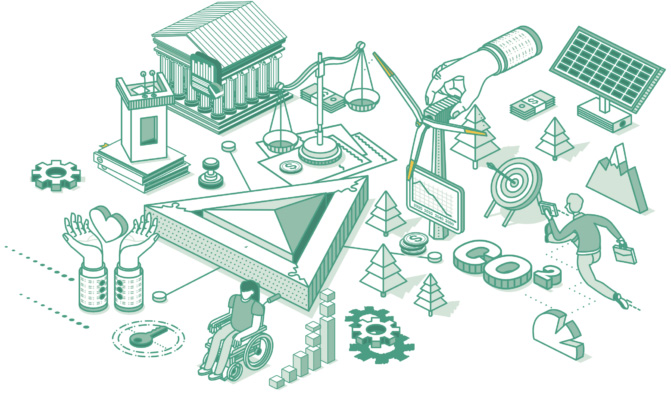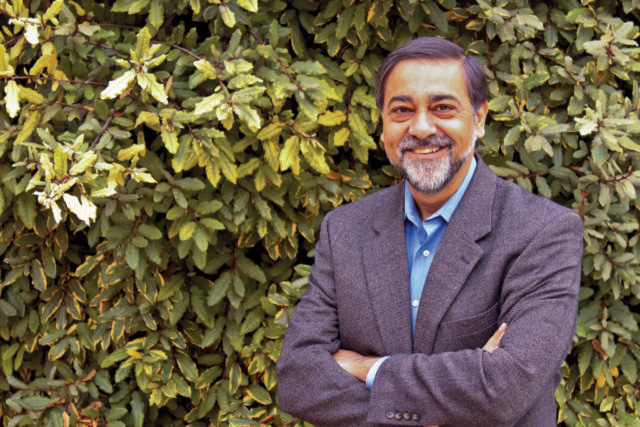Discussion about how work is changing often stops short of the implications for strategy. That has to change.
The rapidly changing nature of work and the implications for talent strategies have been discussed at length in the last two years. There’s plenty to take in: Covid-19 has driven working from home, as well as intra-and inter-country migrations to lower-cost locations; accelerated the digital transformation of knowledge work; boosted salaries; expanded the gig economy; and triggered the Great Resignation. But organizations looking to successfully navigate this dynamic talent environment need to think bigger still. They need to address the changing strategic context – in particular the continued impact of digital transformation, and the rise of ESG (environmental, social and governance) issues and purpose.
Changes in how we work are primarily a consequence of the broader shift from the analogue to the digital economy. As we have explored previously in Dialogue, organizations which focus on automation will always struggle against competitors bringing new business models and value propositions to market (‘How to think strategically in the digital revolution’, Q1 2020). New digital business models require new approaches to strategy, investment and organization, and consequently new approaches to leadership (see also ‘The rise of digital leadership’, Q2 2021). In many instances, today’s approaches to the emerging future of work resemble the early days of digital transformation – the focus is on particular processes or technologies, without a view of the larger strategic and cultural issues.
In the early stages of the digital transformation era, many organizations brought automation into their business models but found that it did not deliver the expected performance results. They had prioritized automation at the expense of the strategic imperative for new growth and business model transformation. Similarly, if leaders today focus on tactical elements of how people work without asking the harder questions about the changing economy and resulting strategic requirements – or about the changing social contract between organizations and talent – they risk applying outdated models to a new reality.
Thinking bigger
The changes under way in how we work go well beyond remote working and videoconferencing. New communication and collaboration technologies have allowed loose affiliations of workers to accomplish things that could once only be done by large corporations. Talent now has a much greater ability to capture the value of its production, be it through equity positions in start-ups, the flexibility of the gig economy, or other new working structures. The most productive talent is expert in using the most productive technologies: they recognize that their contributions and productivity rates are multiples of their counterparts in an analogue economy. In other words, talent is more and more able to quantify its value, and it expects greater rewards for its contributions.
This changing economic relationship is not the only consideration for top talent. Talent also wants to know what organizations are doing on ESG and diversity, equity and inclusion (DEI). Both are affected by digital, which provides greater transparency about progress towards objectives in these crucial areas.
So what does the best and brightest talent want? In my work with hundreds of organizations and thousands of leaders globally, I have observed two key demands becoming steadily more important among talent. The first is understanding how organizations are addressing digital and ESG-driven transformation; the second is to know how they can directly participate in the transformational journey.
The level of engagement needed to address these points goes well beyond traditional approaches to career and leadership development. Talent wants to work with organizations that have a clear ambition and strategy to lead in the changing economy, and they want organizations with a clear mission and purpose, including giving priority to ESG and DEI. They want to work in new structures with new tools, which allow them to make the most impact, and to be rewarded for outsized contributions. They want hands-on experience and executive development which prepares them for the digital economy so they are not left behind, and can develop capabilities which keep them relevant to the new marketplace (particularly capabilities relating to emerging technologies and ESG). They want ownership of or equity in the projects they contribute to. And they want to work on their own terms, with control over when and how they work.
Engaging talent in strategy
Addressing these expectations requires leadership to review both their existing mission and strategy – have these evolved to explicitly address the digital economy, or are they anchored in analogue models? – and how they communicate with and engage the entire organization in execution.
In surveys about the urgency of digital transformation, we regularly ask the question “What else would you like to know about your organization’s digital transformation strategy?” Without fail, the number one response to this question is “What is it?” followed by “Who is leading it?” People can see new competitors, business models and technologies emerging faster than ever, and they recognize that if they are not actively participating in these developments, they and their organizations risk falling behind. Leaders should ensure that their teams are regularly engaged in strategic discussions about business’s future direction, on topics such as:
- What is our strategy to lead in the changing economy?
- What investments are we making across our growth portfolio, be it innovation, mergers and acquisition, corporate venture capital or ecosystems? How are we investing differently to create and drive a growth pipeline?
- How can we have confidence that we’re not going to be disrupted or left behind?
- Are we building a company you want to be part of in two or five years?
- What are our new goals and objectives?
- What impact is the work of individuals, teams and the organization making in our markets, for our customers, and for society more broadly?
- How can we contribute to the evolving strategy? How do you want to be recognized and rewarded for your contributions?
- How are our working practices evolving? How can we remove unnecessary bureaucracy and work at digital speed?
Addressing the strategic challenges associated with the changing nature of work requires material attention in the C-suite and boardroom. The good news is that the evolving expectations of talent are largely aligned with the priorities which organizations are overwhelmingly pursuing, including new growth – particularly technology-driven growth – net-zero and sustainability targets, and inclusion. Winning the future of work requires more than a reorganization of work itself. It demands leadership to craft a bold vision around the urgent demands of growth, emerging technologies, and impact, which engages and inspires talent to contribute to the journey.




